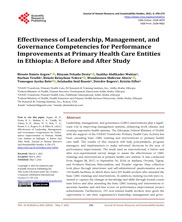Leadership, management, and governance (LMG) interventions play a significant role in improving management systems, enhancing work climate, and creating responsive health systems. The Ethiopian Federal Ministry of Health with the support of the USAID Transform: Primary Health Care Activity has been cascading basic LMG training and interventions to primary health care staff.
The results of this research will help policymakers, program managers, and implementers to make informed decisions in the area of performance improvement. The study used an interventional, before and after non-experimental survey design to assess the effectiveness of LMG trainings and interventions at primary health care entities. It was conducted from August 28, 2017, to September 30, 2018, in Amhara, Oromia, Tigray, and Southern Nations, Nationalities, and Peoples’ regions. Data collection took place through interviewer and self-administered questionnaires across 136 health facilities, in which there were 293 health workers who attended the basic LMG trainings and interventions. In addition, training records were reviewed to capture the changes in knowledge and skills through formal course tests before and after attending the basic LMG training and interventions to ascertain baseline and end-line scores on performance improvement project achievements. Furthermore, 333 non-trained health workers were given the opportunity to rate their organization’s leadership, management and governance culture before and after interventions. The data were analyzed using SSPS IBM V 20. The response rates were 100% for staff who attended the training; and 87% for staff who did not attend the training and who validated their organization’s LMG culture. Of those who attended the training, 235 (80.9%) scored 70% or more on post-test exams, and 252 (86%) scored 80% or more on their performance improvement project objectives.
Using the above-mentioned criteria, composite scores were compiled from written post-test examination score and performance improvement project results. The result showed that 70% (205/293) of basic LMG trainees successfully completed the basic LMG course. As a result of the LMG trainings, management systems, work climate, and responsiveness of the health system to new challenges were significantly improved (p < 0.001). Owing to the leadership projects, within the 136 health facilities, an additional 2290.3 units of health service coverage was gained. Therefore, the basic LMG trainings and interventions were effective in enhancing the knowledge and skills of health workers. It is recommended that providing LMG trainings for more health workers and managers working at primary health care entities will accelerate the implementation of prioritized health sector interventions and is helpful in achieving the Sustainable Development Goals as a global target. An evaluation of the efficiency of the basic LMG training package is also recommended.
Authors: Mesele Damte Argaw, Binyam Fekadu Desta, Sualiha Abdlkader Muktar, Nurhan Tewfik, Bekele Belayihun Tefera, Wondwosen Shiferaw Abera, Temesgen Ayehu Bele, Selahadin Seid Buseir, Deirdre Rogers, Kristin Eifler


